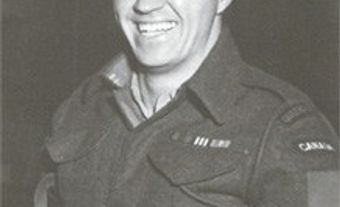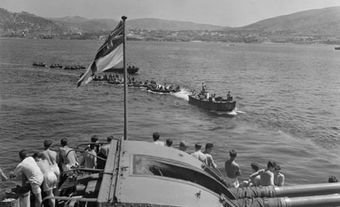This article was originally published in Maclean's Magazine on June 26, 2006
Canadian Troops Dig in for a Long Battle with the Taliban
Just a few days before he and Prime Minister Stephen HARPER made their surprise March trip to visit Canadian troops in Afghanistan, Defence Minister Gordon O'Connor tried to calm growing anxiety about the combat role Canada appeared to be taking on in Kandahar. Asked by Maclean's about what looked like an increasingly dangerous mission in the volatile southern Afghan province, the general-turned-politician seemed exasperated by the impression that Canadian and other coalition forces were taking the fight to the Taliban. "Our role in Afghanistan is not to conduct combat operations," O'Connor said. There might be some "rooting out of insurgents," he allowed, "but we're not primarily there for combat operations."
Three months and a bloody Taliban springtime resurgence later, and the defence minister's reassuring tone rings hollow. Not only have Canadian soldiers engaged repeatedly in full-scale battles in Kandahar, they are expecting much more of the same as they join a massive coalition summer-long push into Taliban sanctuaries in four southern Afghan provinces. It's called Operation Mountain Thrust, and between 500 and 1,000 Canadian combat soldiers will be among the estimated 11,000 troops taking part, including U.S., British, Australian and Romanian contingents, and about 3,500 members of the Afghan army. U.S. military officers say the operation - the coalition's most ambitious military campaign since ousting the Taliban government in 2001 - has been in the works for 18 months.
Reconciling that long planning period with what O'Connor said about the nature of the Kandahar mission in March is not easy. And his soft-pedalled description differs sharply from what Canadian officers say has been going on in the field, and looks likely to intensify. "The coalition here has been going on the offensive," said Lieut. Larry MacIntyre from the Canadian base in Kandahar last week. "We're throwing the Taliban off balance, and Mountain Thrust is a continuation of that." He said the plan for the scorching summer is to advance into villages that have not yet known a significant coalition presence. "It's going to be into some pretty challenging terrain and into areas where we know the Taliban are operating," MacIntyre added. "We're going to extend the authority of the government of Afghanistan."
If the recent pattern holds, the Taliban will put up stiff resistance. In a series of clashes through the spring, the insurgents who represent what's left of the ousted regime, which once made Afghanistan a safe haven for al-Qaeda terrorists, have shown a surprising willingness to engage in drawn-out gun battles. And although coalition troops, including Canadians, have been wounded and killed in these clashes, the conventional fighting is perhaps not entirely unwelcome.
The Taliban had been expected to rely on improvised explosive devices (IEDs), suicide bombings, and other terror tactics imported from the Iraq insurgency. Battles at least give the coalition chances to hit back, rather than just worry about the next roadside blast. "We're seeing more conventional fighting. That is a change of tactic by the Taliban, but they are often losing by such large numbers that it is often bewildering to our planners," MacIntyre said. "I'm not going to say that's a welcome change of tactic, but it's something that we're certainly prepared to deal with." For instance, at least 40 Taliban insurgents were reportedly killed in an early Operation Mountain Thrust move into Paktika province last week.
But if Taliban fighters are trying to hold their positions, at least temporarily, as the coalition advances, they have hardly abandoned Iraq-style tactics. Even as the Taliban took those heavy losses in Paktika, they also claimed responsibility for blowing up a Toyota minibus filled with Afghans on their way to jobs with the coalition forces at Kandahar Air Field, killing 10 people and injuring 17. Five of the dead had worked as interpreters alongside Canadian soldiers.
Afghanistan expert Larry Goodson, a professor at the U.S. Army War College, admits he has been surprised by the amount of conventional fighting. "Like a lot of people, I had anticipated more of a migration of Iraqi tactics, IEDs and suicide bombings and so forth," said Goodson, author of Afghanistan's Endless War: State Failure, Regional Politics, and the Rise of the Taliban. He speculated that Taliban leaders might be testing the coalition's non-U.S. members at a time of transition. Southern Afghanistan is slated to switch from U.S. military control to NATO command later this summer, which means fewer American and more Canadian, British, and Dutch troops are in the region.
O'Connor's denial three months ago that Canadians in Kandahar would be engaging in much combat might have been a miscalculation - underestimating the Taliban's willingness to trade fire. Yet even well after the ferocity of fighting became evident through the spring, he did not to concede that what was unfolding in Kandahar amounted to war, or that Canadian fighters were prodding the Taliban - not merely acting defensively. "I don't consider this war," O'Connor told a Commons committee late last month. He emphasized coalition reconstruction operations, and made the fighting sound reactive. "We're engaged in helping people move products around, we're helping them build houses, we're helping advise the police," he said. "And when we're attacked, we attack back."
That might be accurate, but only in a narrow sense. In fact, Canadian troops in Operation Mountain Thrust are actively putting themselves in a position to be attacked, pressing the Taliban in remote enclaves. "If the Taliban decide to fight, which they have in some cases, we're prepared to fight back," MacIntyre said. Canadian troops have mainly been active up to now in river valleys, but will now be pushing their way into more rugged mountains and deserts. And the coalition's intention is to leave behind permanent outposts of the new Afghan police and army - a development the Taliban cannot take lightly.
O'Connor is not the first senior federal voice to understate the amount of fighting Afghanistan would demand. Back in May 2005, Chris Alexander, then the Canadian ambassador in Kabul, now a UN representative there, said "combat is no longer the name of the game" in Afghanistan. The coalition's focus, he said, had shifted to a blend of diplomacy, aid work, and military mopping-up, to be carried out by so-called provincial reconstruction teams. "Yes, some [combat] still takes place," Alexander said at the time. "But that does not take away from the fact that it is still a low-level insurgency." More than a year later, nobody is calling the insurgency "low-level" - certainly not Canadian troops. As the fighting intensified in the spring, some of them grumbled to Maclean's about the high-level emphasis on nation-building while on the ground they found themselves in a full-fledged war zone.
Operation Mountain Thrust might prove that the coalition - and the struggling Afghan government - can take control even where the Taliban looks toughest. A less definitive outcome might foreshadow a drawn-out conflict with no predictable end. Either way, Canada's involvement, after the recent vote by a slim majority in the House to extend the Afghan mission to February 2009, is deepening. Last week, following a meeting with NATO Secretary General Jaap de Hoop Scheffer in Ottawa, O'Connor said Canada has offered to take command of all NATO forces in Afghanistan in February 2008. Maybe by then the combat demands on Canadian troops will have eased to the point where the reality matches O'Connor's calm words - or the hard fighting will have stretched on for so long that its true nature can no longer be downplayed.
Maclean's June 26, 2006

 Share on Facebook
Share on Facebook Share on X
Share on X Share by Email
Share by Email Share on Google Classroom
Share on Google Classroom


